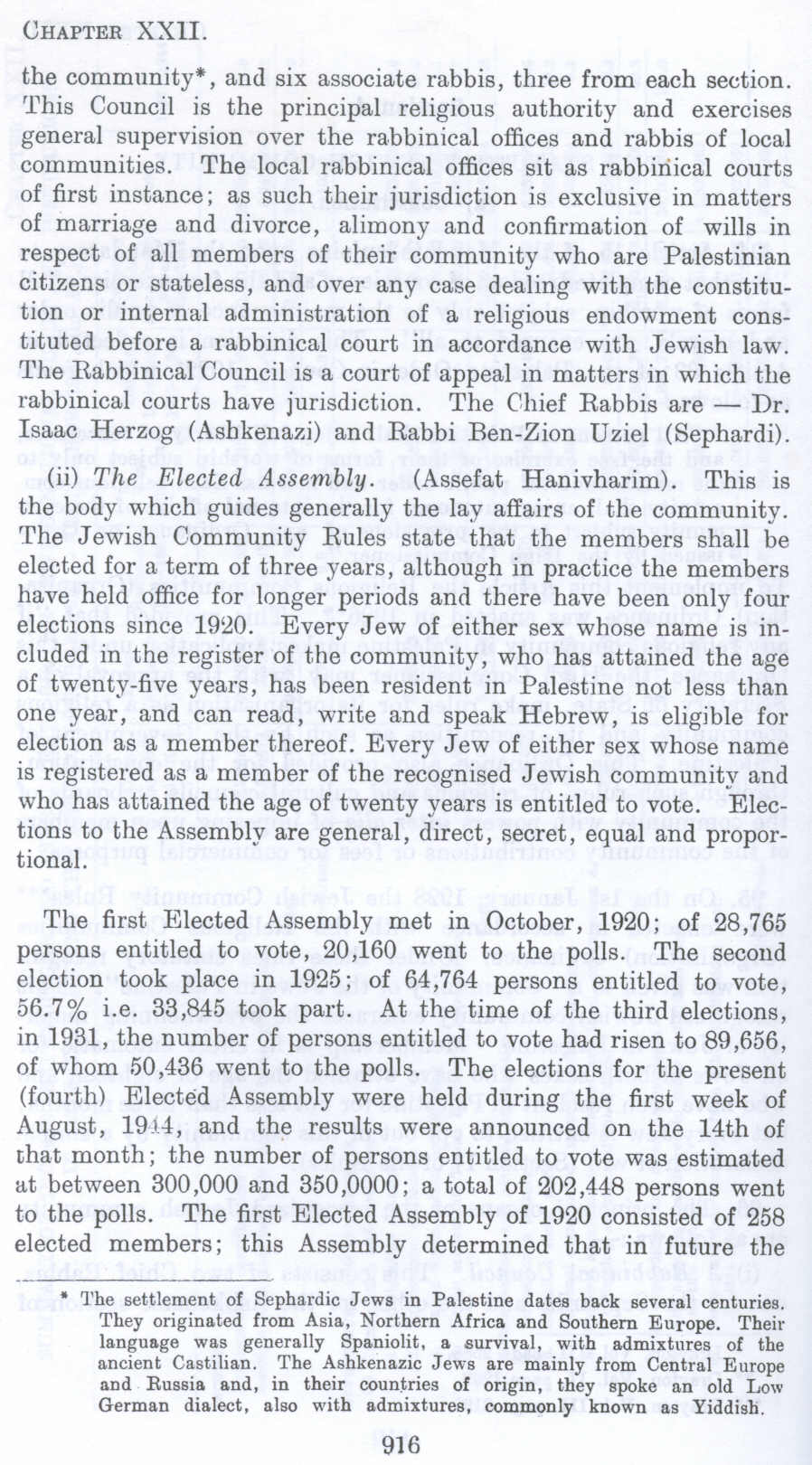| Prev | Next |  |
| Prev | Next |
| PalestineRemembered | About Us | Oral History | العربية | |
| Pictures | Zionist FAQs | Haavara | Maps | |
| Search |
| Camps |
| Districts |
| Acre |
| Baysan |
| Beersheba |
| Bethlehem |
| Gaza |
| Haifa |
| Hebron |
| Jaffa |
| Jericho |
| Jerusalem |
| Jinin |
| Nablus |
| Nazareth |
| Ramallah |
| al-Ramla |
| Safad |
| Tiberias |
| Tulkarm |
| Donate |
| Contact |
| Profile |
| Videos |
British Mandate: A Survey of Palestine: Volume II - Page 916 |
Disclaimer
The above documents, article, interviews, movies, podcasts, or stories reflects solely the research and opinions of its authors. PalestineRemembered.com makes its best effort to validate its contents.


Post Your Comment
*It should be NOTED that your email address won't be shared, and all communications between members will be routed via the website's mail server.
the community", and six associate rabbis, three from each section. This Council is the principal religious authority and exercises general supervision over the rabbinical offices and rabbis of local communities. The local rabbinical offices sit as rabbinical courts of first instance; as such their jurisdiction is exclusive in matters of marriage and divorce, alimony and confirmation of wills in respect of all members of their community who are Palestinian citizens or stateless, and over any case dealing with the constitution or internal administration of a religious endowment constituted before a rabbinical court in accordance with Jewish law. The Rabbinical Council is a court of appeal in matters in which the rabbinical courts have jurisdiction. The Chief Rabbis are - Dr. Isaac Herzog (Ashkenazi) and Rabbi Ben-Zion Uziel (Sephardi).
(ii) The Elected Assembly. (Assefat Hanivharim). This is
the body which guides generally the lay affairs of the community. The Jewish Community Rules state that the members shall be elected for a term of three years, although in practice the members have held office for longer periods and there have been only four elections since 1920. Every Jew of either sex whose name is included in the register of the community, who has attained the age of twenty-five years, has been resident in Palestine not less than one year, and can read, write and speak Hebrew, is eligible for election as a member thereof. Every Jew of either sex whose name is registered as a member of the recognised Jewish community and who has attained the age of twenty years is entitled to vote. Elections to the Assembly are general, direct, secret, equal and proportional.
Tile first Elected Assembly met in October, 1920; of 28,765 persons entitled to vote, 20,160 went to the polls. The second election took place in 1925; of 64,764 persons entitled to vote, 56.7% i.e. 33,845 took part. At the time of the third elections, in 1931, tile number of persons entitled to vote bad risen to 89,656, of whom 50,436 went to the polls. The elections for the present (fourth) Elected Assembly were held during the first week of August, 19U, and the results were announced on the 14th of chat month; the number of persons entitled to vote was estimated at between 300,000 and 350,0000; a total of 202,448 persons went to the polls. The first Elected Assembly of 1920 consisted of 258 elected members; this Assembly determined that in future the
* The settlement of Sephardic Jews in Palestine dates back several centuries. They originated from Asia, Northern Africa and Southern Europe. Their language was generally Spaniolit, a survival, with admixtures of the ancient Castilian. The Ashkenazic Jews are mainly from Central Europe end Russia and, in their countries of origin, they spoke an old Low German dialect, also with admixtures, commonly known as Yiddish.
916